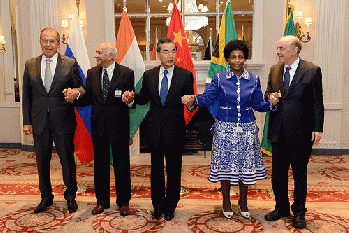The 8th summit of BRICS, a bloc of Brazil, Russia, India, China and South Africa, ended in Goa, India on Sunday (October 16) with a lengthy communique' dubbed as Goa Declaration.
The 7,000 plus words document covers a range of measures, including establishing a new credit ratings agency, fighting tax evasion and combating terrorism.

International Relations and Cooperation Minister Maite Nkoana-Mashabane at the 10th BRICS Foreign Ministerial Meeting, 20 Sep 2016
(Image by GovernmentZA) Details DMCA
The October 15-16 BRICS summit was attended by Chinese President Xi Jinping, Russian President Vladimir Putin, Brazilian President Michel Temer, Indian Prime Minister Narendra Modi and South African President Jacob Zuma.
The five BRICS leaders, who just met last month in the eastern Chinese city of Hangzhou when China hosted the 11th summit of the Group of 20 (G20) major economies, welcomed the G20 Action Plan on the 2030 Agenda adopted during the Hangzhou Summit and committed to its implementation by taking bold transformative steps through both collective and individual concrete actions.
The declaration welcomed the inclusion of the RMB into the Special Drawing Rights currency basket on Oct. 10, and urged advanced European economies to meet their commitments to cede two chairs on the Executive Board of the IMF.
On the security front, the bloc strongly condemned the recent attacks against some BRICS countries, and strongly condemned terrorism in all its forms and manifestations, while stressing that there can be no justification whatsoever for any acts of terrorism, whether based upon ideological, religious, political, racial, ethnic or any other reasons.
The bloc agreed to strengthen cooperation in combating international terrorism both at the bilateral level and at international fora, and called on all nations to adopt a comprehensive approach in combating terrorism.
Russian President Vladimir Putin says that BRICS reflects the member-countries' commitment to uphold international law when some Western countries are trying to promote unilateral approaches. In an interview on the occasion of the 8th summit in Goa, India, Putin described BRICS as one of the key elements of the emerging multi-polar world.
"The five (member) countries have consistently reaffirmed their commitment to the fundamental principles of international law and promote the central role of the UN," he said adding: "Our countries reject the policy of coercive pressure and infringement upon the sovereignty of other states. We take similar stances on urgent international issues, including the Syrian crisis and the Middle East settlement."
However, Liu Zhen writes in South China Morning Post, "the BRICS countries share few political, economic, social and even foreign policy interests except for shared unhappiness about the domination of global governance by the West."
Al Jazeera asked how relevant is BRICS today? Brazil, Russia, India, China and South Africa form the bloc of emerging economies, but is their influence decreasing? For several years now, the most talked-about trend in the global economy has been the rise of developing markets. Some economists expected Brazil, Russia, India, China and South Africa to lead the world to new economic heights. But as the BRICS bloc met for its 8th summit in India's state of Goa, those hopes appeared to be fading.
Astrid Prange, editor of Deutsche Welle wrote: "The BRICS family is dead, the BRICS states live! At their summit in Goa, Brazil, Russia, India, China and South Africa should end the fairytale of a common rise.... The honorable participants at the Goa summit have begun desperately searching for what they hold in common and are shocked to discover there is very little in common left."
BRICS as an economic grouping of newly industrialized countries "seems to be losing its relevance other than being a feel-good club, writes G. Pramod Kumar in The Huffington Post. Advising India not to push its anti-Pakistan strategy at the forum, he adds, "If the seventh summit at Ufa in Russia last year was about the much celebrated BRICS Bank (New Development Bank) and contingent reserve arrangement, all that we hear about the eight summit in Goa is geopolitics: terrorism, military cooperation with Russia and isolation of Pakistan.
Pakistan's Dawn newspapers highlighted the difference between Modi and Chinese President Xi Jinping, "He (Modi) obliquely disputed Chinese President Xi Jinping's apparent reluctance to pin the blame on Pakistan, but the Chinese leader responded by seeking political solutions to the hotspots" With the differences between India and China out in the open--against the backdrop of Delhi's attempts to isolate Islamabad--the Goa declaration stopped short of mentioning the Uri attack."
Pakistan strongly reacted to Indian Prime Minister Narendra Modi's remarks that the neighbor is the "mothership of terrorism", as Premier Nawaz Sharif's foreign affairs adviser Sartaj Aziz said Modi was "misleading" the BRICS countries over the issue. He said that the Indian leadership is "desperately trying to hide its brutalities" in Jammu and Kashmir. Sartaj Aziz also said the United Nations and the Organisation of Islamic Cooperation (OIC) have "rejected Indian attempts to equate Kashmiris' movement for self-determination with terrorism."
(Note: You can view every article as one long page if you sign up as an Advocate Member, or higher).





